The Importance of Sunscreen: Protecting Your Skin From Harmful UV Rays

When it comes to the importance of sunscreen, we all know the basics; sunscreen helps to protect the skin from the sun’s UV rays.
However, what exactly do these UV rays do to the skin? And how do you go about choosing the best sunscreen for your skin? Read on – OROGOLD has all of the answers!
The Importance of Sunscreen Explained
We’re told time and time again to respect the importance of sunscreen. However, it becomes so much easier to do this once you fully understand the role that sunscreen plays in keeping your skin looking and feeling healthy. Let’s take a look at just a few of the ways in which a good sunscreen could help your skin and body:
It Prevents the Appearance of Premature Aging
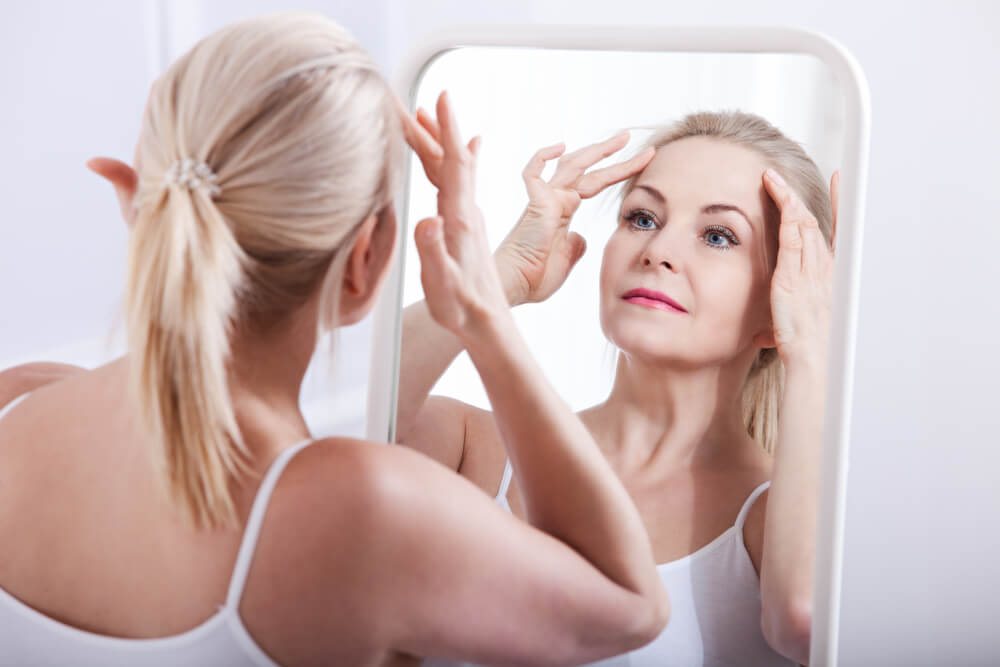
If you’re hoping to keep the appearance of skin aging at bay for as long as possible, then you need to be committed to wearing a sunscreen.
The sun’s UV rays are extremely damaging to the collagen and elastin fibers in your skin. These are the proteins that give your skin its structure and volume. Without them, the skin sags and loosens, resulting in wrinkles and an aged appearance.
For many people, the importance of sunscreen is all about keeping their complexion youthful. There is so much research out there confirming how the use of sunscreen can prevent the look of aging, making SPF vital if you want to avoid developing a wrinkled appearance.
It Lowers Your Risk of Skin Cancer
For many people, the importance of sunscreen is all about maintaining a healthy appearance. However, the sun’s UV rays go beneath the surface of the skin and wreak havoc on a much deeper level. When this happens, skin cancer is formed. As you probably know, this can have devastating effects.
Even more frightening is how the prevalence of skin cancer is on the rise. Statistics show that 1 in 5 Americans will likely develop skin cancer by the time they hit the age of 70, making it vital to keep your skin protected with a sunscreen.
It Prevents the Appearance of Hyperpigmentation
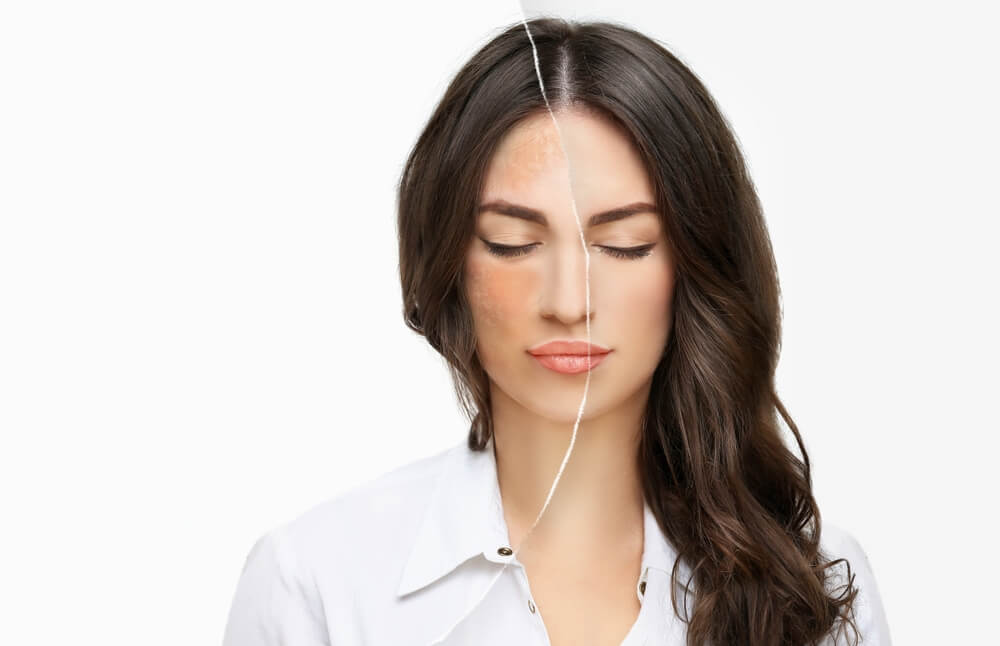
Whenever your skin comes into contact with the sun’s UV rays, it produces melanin. This is your skin’s pigment. It’s responsible for the color of your skin, but its main purpose is to provide a natural defense against UV rays.
In theory, this is great. If melanin can keep your skin protected from the sun, then bring it on – you will also need fewer visits to a dermatologist – it’s a win-win!
Unfortunately, in reality, it doesn’t work quite that way. Melanin will only provide protection to a certain extent. After this, unprotected skin is still highly susceptible to damage.
Even worse, when the skin starts to produce too much melanin, it isn’t able to spread these cells evenly throughout the skin (in the way that it does when it gives you a tan). As a result, the pigment ends up clustering underneath certain areas of your skin, resulting in those parts of your face or body taking on a darker and discolored appearance.
It can take a while to treat the visibility of dark spots, making prevention with a sunscreen a far better plan.
It Reduces the Risk of Sunburn
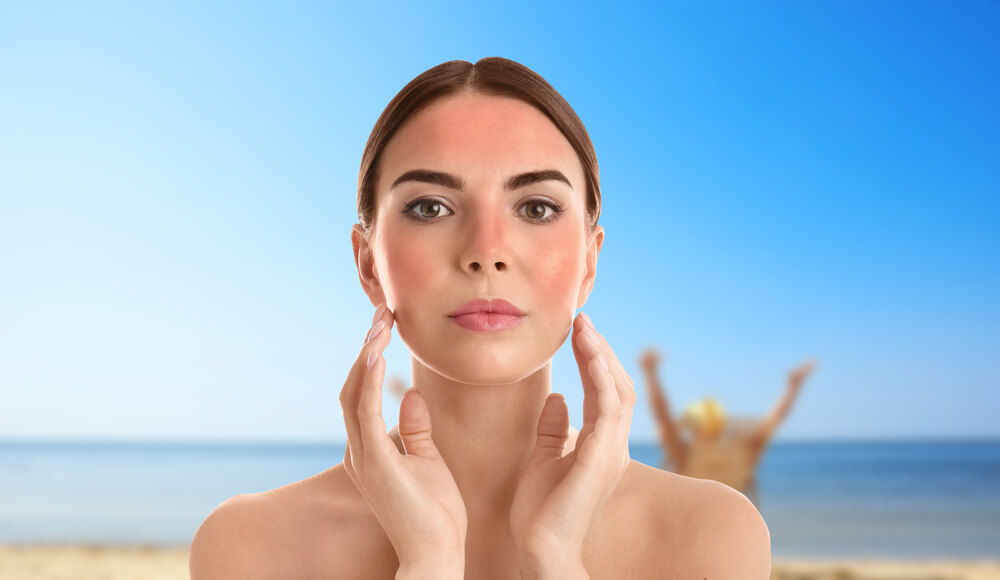
Chances are that you’ve been sunburnt at least once in your life. However, did you know that experiencing five sunburns doubles your risk of developing skin cancer?
Not only that, but sunburns can also lead to other forms of skin damage, including scarring. Not to mention, they can be very painful! By keeping your skin protected with a sunscreen, your complexion will be able to remain sunburn-free!
It Reduces the Feeling of Inflammation
Sunburns are an inflammatory reaction to the sun’s UV rays. However, even if your skin doesn’t burn, don’t be fooled into thinking that the sun hasn’t triggered your skin’s inflammatory response.
Even a small amount of sun exposure can lead to inflammation in the skin. You may not be able to see it from the surface (although you might notice slight redness), but it will be doing its damage beneath the outer layer of your skin.
What does inflammation do to the skin?
It can accelerate the skin aging process, trigger acne breakouts, and so much more. By understanding the importance of sunscreen, you’ll be able to save your skin from feeling inflamed, which will keep it looking balanced and healthy.
Picking the Best Sunscreen For Your Skin
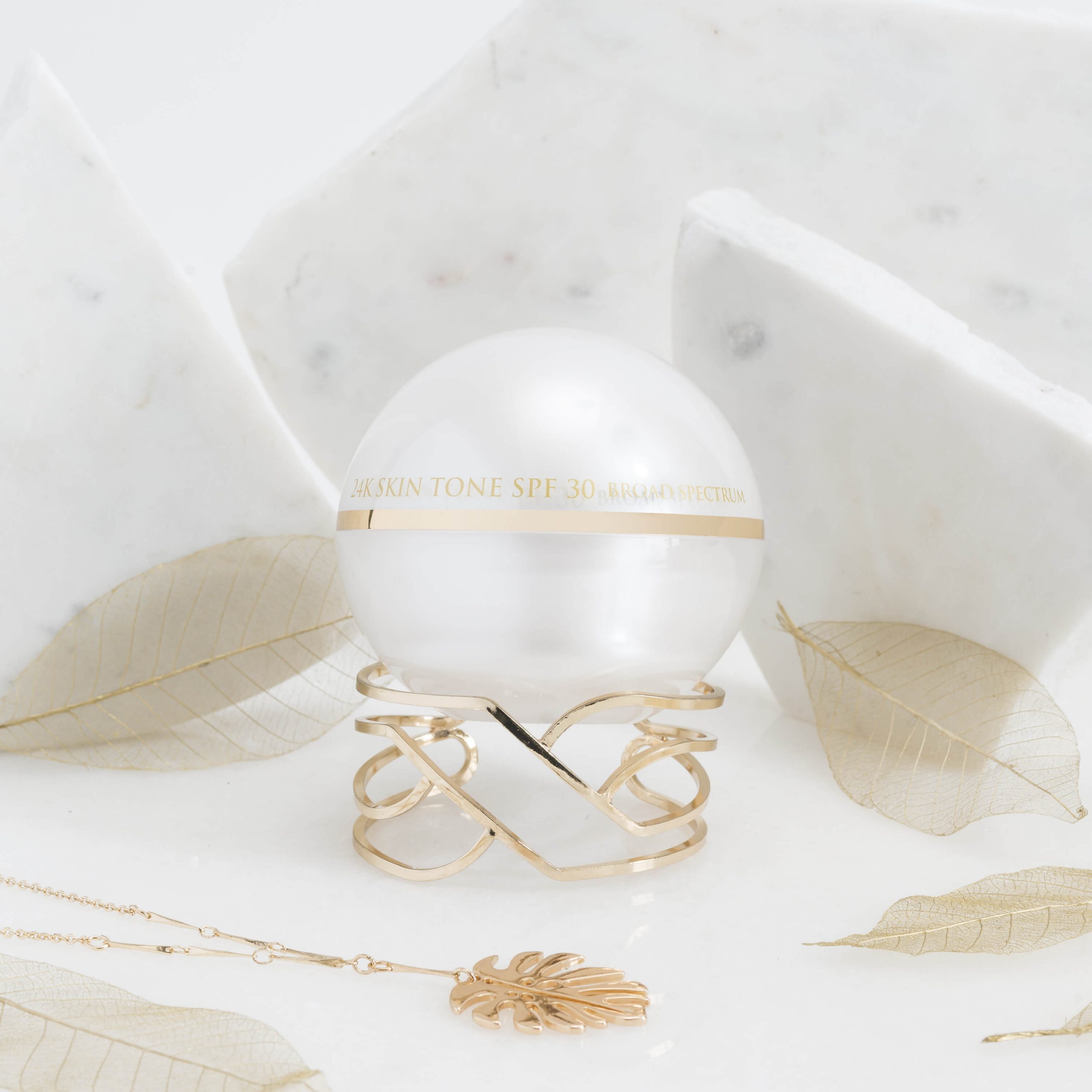
Now that you’re better acquainted with the importance of sunscreen, you’re probably wondering where to begin when it comes to upgrading that dusty old bottle of sunscreen sitting at the back of your skincare shelf.
Well, when it comes to picking a new sunscreen for everyday use, look for an SPF of at least 30. If you spend a particularly long time out in the sun each day, then you may want something slightly higher.
Ideally, you also want a formula that feels lightweight and sheer on the skin. This way, it will absorb quickly and won’t leave your skin looking greasy or unnaturally white after application.
This is where the OROGOLD 24K Skin Tone SPF 30 really stands out. It melts into the skin quickly, leaving the complexion fresh and dewy rather than oily.
What makes this product extra special is how it’s infused with multiple antioxidants too. From vitamins A and E to green tea extract, this formula will not only protect your skin from the appearance of premature aging, but it will also help to repair the look of any aging-related damage that is already visible on your skin.
Since our sunscreen was designed to double up as a day moisturizer, it contains several hydrating ingredients too. Aloe vera leaf extract and glycerin both function as humectants. They bind moisture to the skin to plump up the complexion and keep it feeling soft and supple.
And, as with all OROGOLD products, this formula also contains gold. It’s an ingredient that adds radiance to the skin, so you can expect your face to be glowing after each application!
When and How Often to Use a Sunscreen
When should you be using a sunscreen? It’s pretty simple – all the time during the day! Unless you happen to be spending the entire day in a windowless basement, then sunscreen is a must.
The time of year doesn’t matter either as the sun’s UV rays are present and dangerous year-round. They can penetrate through glass and thick clouds too. This means that even when you’re driving around in your car on a dull and cloudy day, or daydreaming by your office window, the sun’s UV rays are still damaging your skin.
What makes things a little more complicated is that one application of sunscreen in the morning isn’t going to last you the entire day. The higher its SPF, the longer its effects will extend for. However, in general, you can expect to have to reapply your sunscreen every 2-3 hours.
This makes it worth having a few different jars of sunscreen in your life. Keep one at home on your dresser, one in your office, and perhaps also one in your car. This way, you’ll never be without your trusty SPF!
How to Properly Apply a Sunscreen
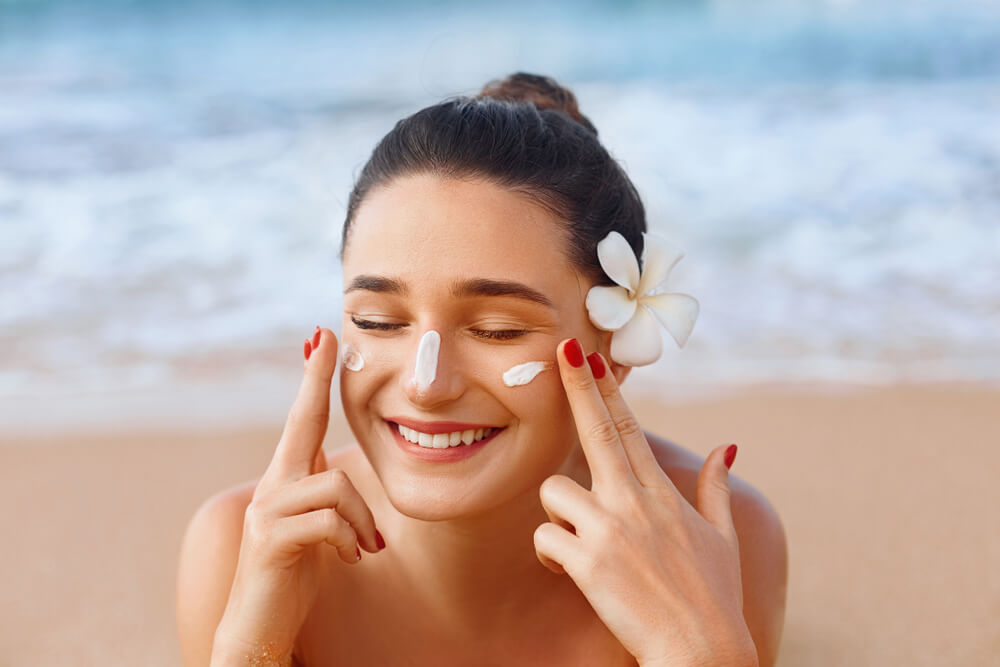
Applying sunscreen may seem like a no-brainer. Surely you just massage it into your skin in the same way you would a face moisturizer?
In some ways, yes. However, you need to pay close attention to how much product you apply each time. Most people end up using too little, meaning that their skin isn’t receiving the full level of SPF protection printed on the label. As a result, they end up experiencing sun damage even when they think that their skin is protected.
Ideally, when applying sunscreen to just your face and neck, use about half a teaspoon full. If you need to cover your entire body, then one ounce would be sufficient. That said, don’t be afraid to use more! When it comes to making the most of the importance of sunscreen, too much is definitely better than too little.
Once you’ve applied your sunscreen, try to give it 10-15 minutes to kick into action before you step out into the sun. If you expose your skin to the sun any sooner than this, then it will still be vulnerable to all of the damage that those UV rays can cause.
Other Ways to Protect Your Skin From the Sun’s UV Rays

If you want to protect your skin from UV rays as much as possible, then, in addition to understanding the importance of sunscreen, there are a few extra steps that you should be taking.
For starters, try to keep your skin physically covered as much as possible. Long clothing will provide an extra barrier between your skin and the sun. The thicker the fabric, the more effective it will be at shielding your skin. Wearing long but loose styles of clothing in light colors will help to ensure that you don’t end up feeling too hot.
You should also own a variety of sun-protecting accessories. Oversized sunglasses will help to keep your delicate eye area protected from UV rays. Meanwhile, a wide-brimmed hat will block the sun from your face.
You could even take things a step further by carrying a parasol or umbrella with you on particularly sunny days. Studies show that a black handheld umbrella has the potential to block at least 90% of the sun’s UV rays! Carrying an umbrella around may seem cumbersome at first, but your skin will most definitely thank you for it.
There are also certain foods out there that can help to ramp up your body’s natural sun protection. These don’t come close to comparing to the importance of sunscreen itself, but they can help you to fortify your defenses a little more. Tomatoes, sweet potatoes, and spinach are particularly beneficial, as are berries and pomegranates.
Summary
When it comes down to it, there really is no denying the importance of sunscreen. Just this one single product can do so much for your complexion, while also helping to keep your risk of developing skin cancer to a minimum. Commit yourself to regularly using a sunscreen now and your future self will be extremely appreciative!




 A.U.
A.U. B.R.
B.R. C.A.
C.A. E.S.
E.S. H.K.
H.K. M.X.
M.X. N.L.
N.L. P.R.
P.R. S.G.
S.G. T.W.
T.W. U.K.
U.K. S.A.
S.A.


